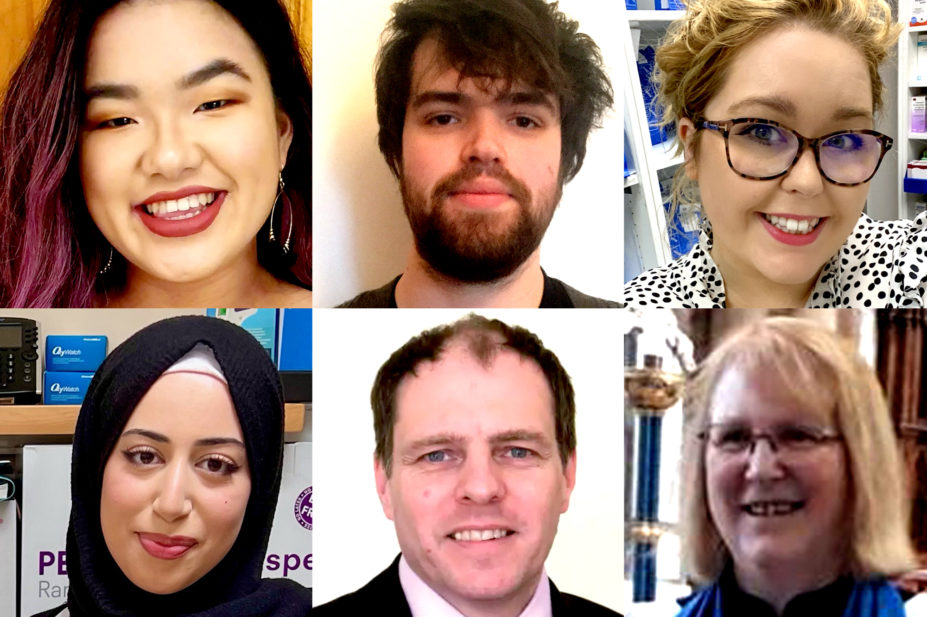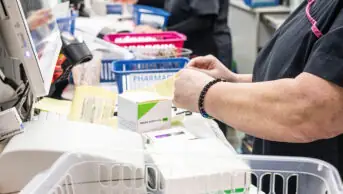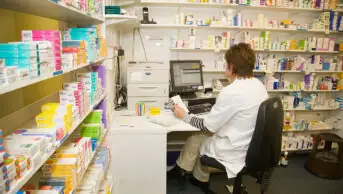
In June 2022, the first ever cohort of foundation pharmacy trainees took the registration exam. And, despite technical problems causing delays for some students, they made history as the first group to undertake this training at this stage of their careers.
In many ways, foundation training is very similar to the previous preregistration year, requiring students to complete 52 weeks of supervised training in a pharmacy, with progress being monitored and trainees signed off if they meet certain learning objectives.
But, under reforms gradually being rolled out to the initial education and training of pharmacists, trainees will get their independent prescribing (IP) qualification during the foundation training year by 2026.
In the meantime, there have been other changes, with new General Pharmaceutical Council standards, approved in December 2020, to adhere to and training institutions already changing their approach to include more information around clinical decision-making (see Box).
Now, almost a year since the first cohort of foundation trainees started, we found out more about how it went.
‘I would like more support for trainees in independent community pharmacies’
Vivien Yu, community pharmacy trainee
Looking back on the past year, I now realise how much more confidence and knowledge I have gained over the short period of time.
I spent the year carrying out different patient group directives, looking up information to aid the independent prescribers and knowing when to refer. I was also lucky enough to be taught some clinical skills, such as listening to chests, taking blood pressure and looking at patient’s throats.
I now feel ready to embark on my next stage as a pharmacist, confident on when to treat, when to refer and what to advise.
The assessment process was not a pleasant experience. The stress of the exam is a lot to take on and has caused a lot of health issues that I’m still suffering with and have been referred to the hospital for. The exam day did not go as well as I would have liked — the first paper rattled me. However, the big day is done and all we can do is wait for the results.
I would like more of a support system during the foundation training year, especially for trainees in independent community pharmacies. Most hospitals have monthly training sessions, calculation days and mock exams; and the bigger chains, such as Boots and Lloyds, have networking events, webinars and practice questions. It would be nice if there was a support system for trainees in smaller pharmacies, who do not quite fit into those groups.
Vivien Yu competed her foundation year in a Bannerman’s community pharmacy in Glasgow, Scotland
‘There was perhaps too much of a focus on reflection, when I could be experiencing more clinical stuff’
Joseph Thompson, hospital pharmacy trainee
Early in my foundation training year, I was encouraged to chat to different people within the department and it has been really nice to get a different perspective from everyone: pharmacy technicians, dispensing assistants, all the way up to the specialist pharmacists at NHS band 8 and above.
It is really interesting to talk about clinical aspects, but then also prepping to do the more practical things, such as supplying medication, which has really helped. Although the hospital I am based at is a little small — it doesn’t have an A&E; it’s more like a step-down hospital — so I don’t necessarily get the broadness of experience I want.
However, in Wales, Health Education and Improvement Wales (HEIW) ran regular monthly learning events up until April 2022. The trainee pharmacists within a given region attend a day of lectures or a day of practical training. We did mock exam questions and we had specialist pharmacists coming in to talk about specialist clinical areas, such as cardiac pharmacy or antibiotics. There were other healthcare professionals who came and talked to us, such as paramedics talking through first aid, and some doctors came in as well.
Among learning events in parts of the hospital site, we were also asked to do patient profiles. Here, we picked a patient we found particularly interesting that week and then talked through what interventions we would do now and in the future. That was particularly good.
My supervisors were really helpful and supportive throughout the whole 52 weeks. I also quite liked some of the revision tools that HEIW recommended, as well as the Royal Pharmaceutical Society’s learning resource tools.
What I would say is that I feel like there is too much of a focus on the reflective writing part of the e-portfolio, which sometimes bled into time that I could be using to experience more clinical training. It sometimes did not feel like it was being utilised as well as it could be.
Joseph Thompson completed his foundation training year in Nevill Hall Hospital, in Abergavenny in Wales
‘We discussed progress throughout the year, which saved a lot of time’
Rachel Nealan, community pharmacy trainee
I feel like my foundation year prepared me extremely well for my future practice. Working full time with other pharmacy professionals provided me with the skills and knowledge around services and systems, as well as clinical knowledge. I was given a lot of learning opportunities, including a placement within a hospital, and took part in patient consultations and services, which also helped me build my skill set.
We had regular conversations about areas I was doing well in, as well as areas of improvement, which helped me focus. My supervisor thought it was best to have ‘learning event’ forms, where we both recorded and reflected on how I performed in a practical task. This was a more relaxed approach and we used these as a template to build into everyday practice. We would then verbally discuss feedback and progress throughout the year. This saved a lot of time and helped us to complete more learning events.
I was also enrolled into the Sunderland University Foundation Training Programme, which helped massively with my revision for the exam.
Rachel Nealan completed her foundation training year in Lynemouth Pharmacy in Northumberland
‘Taking part in a direct-acting oral anticoagulant audit was really useful’
Zainab Issa, primary care pharmacy trainee
At the beginning of the year, face-to-face patient time was still quite restricted, though not too much. But we have done a lot of shadowing of people at GPs or even at vaccination centres and speaking to them a lot on the phone. So even then, just knowing how to structure our reviews, or how to make sure we’re asking the appropriate questions; that was still part of the training year.
On Wednesdays, we have study sessions and sometimes we go through a case with our supervisor Graham Stretch on something that we found particularly interesting, or something where we had to use certain guidelines.
Taking part in a direct-acting oral anticoagulant audit was really useful because I got to check how the prescribing was in the practice — making sure the monitoring was OK really helped me learn in a lot of depth.
Zainab Issa completed her foundation training in primary care with the Argyle Health Group, London
‘I have included more detail on prescribing decisions’
Graham Stretch, primary care pharmacy trainer
There was not a huge amount of difference in practical terms during this first foundation training year. Usually most of the learning comes from patient-related incidents — for example, where either something’s gone wrong or there is an interesting presentation — and the routine procedural aspects of the job, such as prescription ordering, blood monitoring, when to do a review and check that the medication is still correct, etc. None of that has changed.
What I’ve tried to do differently this year is to include some of the kinds of ethical and clinical reasoning aspects of prescribing decisions in more detail than I might well have done in previous years, where I might have been thinking, “well, that will come later”.
I have also treated this cohort differently in terms of the learning outcomes, some of which are new. I have had much more of an emphasis on inclusivity, for example, and being mindful of people’s protected characteristics. We have tried to talk about our patients: last week we had a patient who is deaf, which was a useful training scenario.
Graham Stretch is a primary care pharmacy trainer and chief pharmacist at Argyle Health Group, and clinical director at Brentworth Primary Care Network
‘We added in teaching on genomics’
Julie Martin, hospital pharmacy trainer
It was a challenge getting our heads around the new learning outcomes at such short notice, so we did not make huge alterations to our programme. However, we added in some extras during the year, such as taught sessions on genomics, advanced therapies, and ward-based blood pressure and temperature assessment with our nursing colleagues.
We introduced a block of training for medicines advice, followed by practice, which went well and will continue next year. We also delivered a combination of online and face-to-face teaching sessions to support trainees both at University Hospital Southampton and across Hampshire and the Isle of Wight to minimise travel and to maximise learning.
When it comes to what we might like to see done differently, the portfolio supplied by Health Education England and the Royal Pharmaceutical Society was very cumbersome to use and quite unhelpful at times. We hope to see an improved version for 2022/2023. We were also hampered a bit by COVID-19 on the wards earlier on in the year.
Julie Martin is a primary care pharmacy trainer and head of healthcare scientist and pharmacy education at University Hospital Southampton NHS Foundation Trust
Box: What’s new? The interim learning outcomes
Previously, preregistrations trainees were assessed by their tutor against a range of 76 performance outcomes. If the tutor was happy that the trainee had made sufficient progress, they could then go on to sit the registration assessment held twice per year.
However, as part of wider reforms to the initial education and training of pharmacists, the General Pharmaceutical Council has developed learning outcomes that cover the whole five years: four years on the MPharm and one year of training.
But it is going to take time to roll out the changes — a sudden overhaul would mean switching students part-way through the course onto a new set of learning outcomes, so the reforms are to be brought in gradually.
In the meantime, the regulator developed an interim set of learning outcomes for the 2021/2022 foundation training year. These replaced the older preregistration performance standards.
These foundation-level learning outcomes include strengthened supervision support and collaborative working, and a greater emphasis on equality, diversity and inclusion to combat discrimination and deal with health inequalities.


